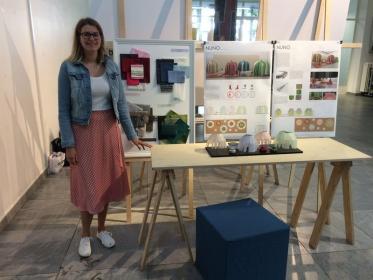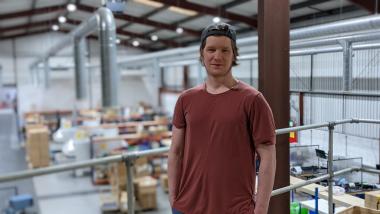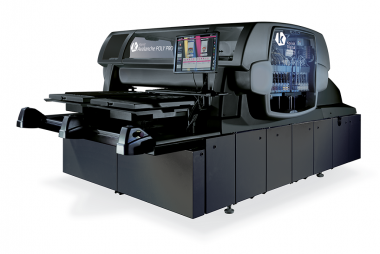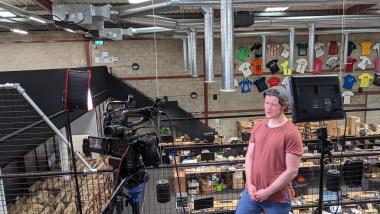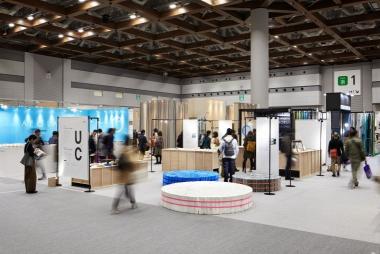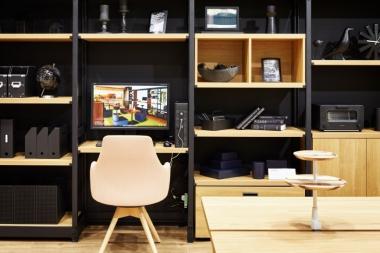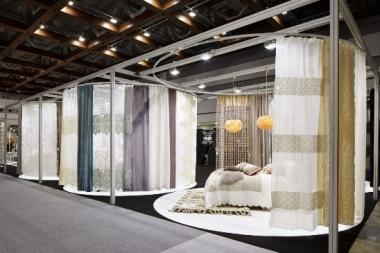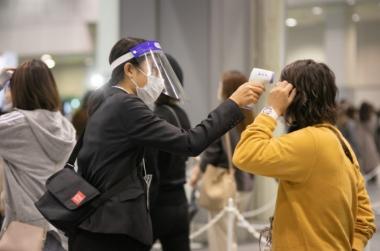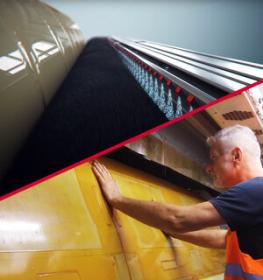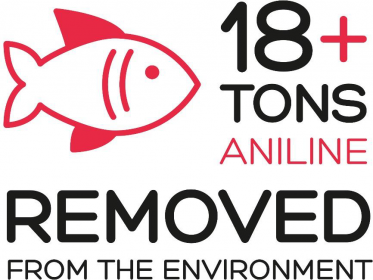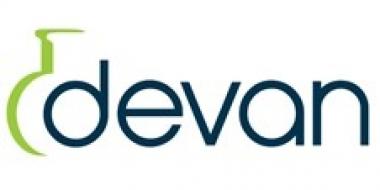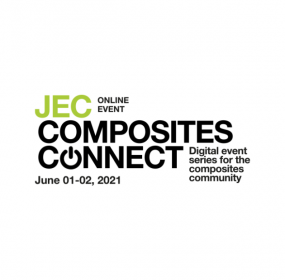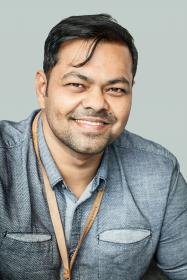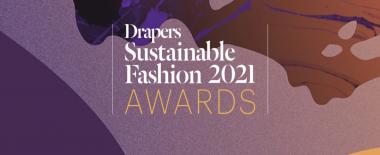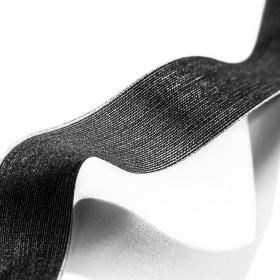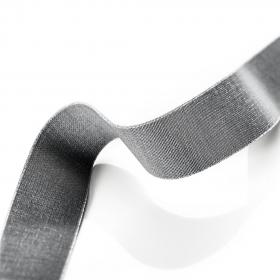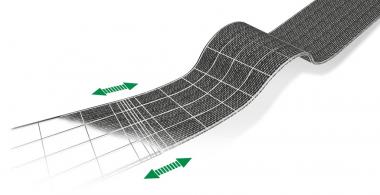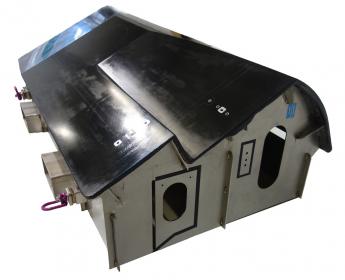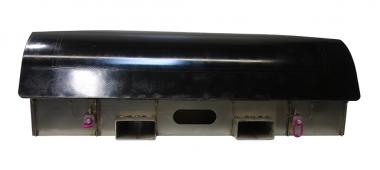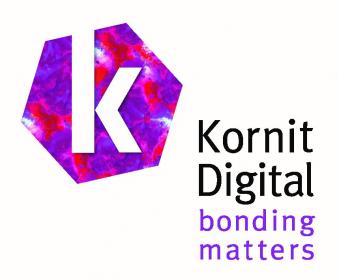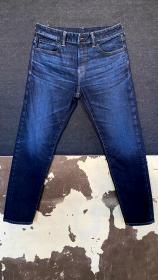Innenarchitektin entwickelt neuartigen Messestand mit drapilux-Stoffen
Wie kann ein Stoff den Raum verändern? Können Textilien zum Mittel der Kommunikation werden? Diese Fragen stellte sich auch Sharon Kisser während ihres Studiums an der Hochschule Mainz. „Textilien sind nicht nur zum Ansehen da, man muss sie auch erleben können“ lautet die Devise der aufstrebenden Innenarchitektin. So entstand in Kooperation mit dem Emsdettener Textilunternehmen drapilux der Entwurf des Messestandes „Material macht Raum“. Ein Konzept, bei dem klar wird: Hier geht es um „mehr als nur Stoff“.
„Stellen Sie sich ein Krankenhauszimmer ohne Vorhänge oder Bettwäsche vor, ein Wohnzimmer ohne Kissen, Teppiche und Vorhänge. Sitzen Sie bei einer Veranstaltung lieber auf einem harten Stuhl oder einem gepolsterten? Denken Sie an einen verschneiten Wintertag mit Kakao, aber ohne die Lieblingskuscheldecke. Das ist alles möglich, aber geht da nicht die Gemütlichkeit verloren?“ Ein Gedanke, der Sharon Kisser inspiriert, denn Textilien sind ihre Leidenschaft. Die Junior Innenarchitektin weiß, wie Stoffe unsere Wahrnehmung beeinflussen: Textilien begleiten uns jeden Tag, verleihen unseren Räumen eine eigene Identität, schaffen Atmosphäre und geben uns das Gefühl von Geborgenheit. Ein Aspekt, der insbesondere in der heutigen Zeit immer mehr an Bedeutung gewinnt.
Schön und smart
Ebendieser Gedanke legte den Grundstein zu Sharon Kissers Projekt „Material macht Raum“. Mit ihrem Entwurf eines Messestands, der die Stoffe von drapilux auf eine neue Art erlebbar macht, zeigt die ehemalige Mainzer Studentin, dass Textilien mehr zu bieten haben, als eine schöne Optik. Aufgehängt an Metallbögen schwingen Stoffbahnen frei im Raum, werden zu kleinen Zelten, bereit betreten zu werden. Im Inneren offenbaren sie dann ihr Geheimnis: Die intelligenten Zusatzfunktionen von drapilux. Diese neutralisieren Gerüche (drapilux air), mindern Lärm und Geräusche (drapilux akustik) und reduzieren sogar mehr als 99 Prozent der schädlichen Bakterien auf der Textiloberfläche (drapilux bioaktiv). Auch im Brandfall schützen die speziell ausgerüsteten Textilien, denn alle Stoffe des Emsdettener Herstellers sind flammhemmend (drapilux flammstop). Es ist ein gekonntes Zusammenspiel von Design und Funktion, das alle Sinne direkt anspricht. „Mein Ziel war es, für den Besucher eine Erlebniswelt zu erschaffen, die er erkunden und verstehen möchte“, erklärt Kisser ihr Projekt. Das Konzept lässt sich in den Alltag übertragen – ein schönes Design ist nicht mehr alles, Textilien müssen funktional sein und sich unseren individuellen und modernen Lebensgewohnheiten anpassen. Kurz: Sie müssen mehr sein als nur Stoff. „Auf der Suche nach außergewöhnlichen Textilien für mein Projekt bin auf drapilux aufmerksam geworden. Hier tat sich für mich eine neue Sparte auf, denn bisher wusste ich sehr wenig über Stoffe mit intelligenten Funktionen“, erinnert sich Kisser.
Stoff mit Zukunft
Aufgrund der aktuellen Situation sind viele Menschen zu Hause oder arbeiten im Homeoffice. „Gerade in Krisenzeiten sehnt man sich nach einer Umgebung der Entspannung, einem Rückzugsort“, bestätigt Kirstin Herrmann, Leiterin des Design Studios bei drapilux. „Textilien schaffen eine Atmosphäre, die perfekt auf individuelle Arbeits- und Raumbedürfnisse abgestimmt ist und diese ergänzt. Sowohl in den eigenen vier Wänden als auch am Arbeitsplatz spielt der Wohlfühlfaktor eine ganz entscheidende Rolle.“ Essenziell ist der Einsatz von Textilien natürlich auch in den Räumlichkeiten von Senioren- und Pflegeheimen oder Krankenhäusern. In einer fremden Umgebung ist der Wunsch nach Geborgenheit und Sicherheit allgegenwärtig; Textilien greifen diese Bedürfnisse auf und kommunizieren sie. Farben, Strukturen und Design helfen, die Raumatmosphäre positiv zu beeinflussen, genau wie die unsichtbaren intelligenten Zusatzfunktionen, die beispielsweise mit ihrer luftreinigenden Eigenschaft das Raumklima unterstützen oder die die Raumakustik harmonisieren. „Es ist wichtig, dass Funktion und Design perfekt zusammenspielen“, betont Herrmann.
Das rät auch Kisser: „Während des Studiums habe ich gelernt, dass man bei der Auswahl von Textilien auch mal mutig sein sollte. Es muss nicht immer die vorsichtige Kombination von grau und beige sein. Miteinander kombiniert werden einzelne Muster und Farben zu wahren Hinguckern und werten den Raum optisch auf.“ Auch die Haptik spielt eine große Rolle. „Natürlich muss die Qualität stimmen, die Textilien müssen strapazierfähig und robust sein. Gleichzeitig ist es wichtig, dass sich die Stoffe, mit denen wir uns umgeben, beim Berühren angenehm anfühlen. Der richtige Einsatz von Textilien kann das Gefühl und die Aussage eines Raumes komplett verändern.“
schönknecht : kommunikation


